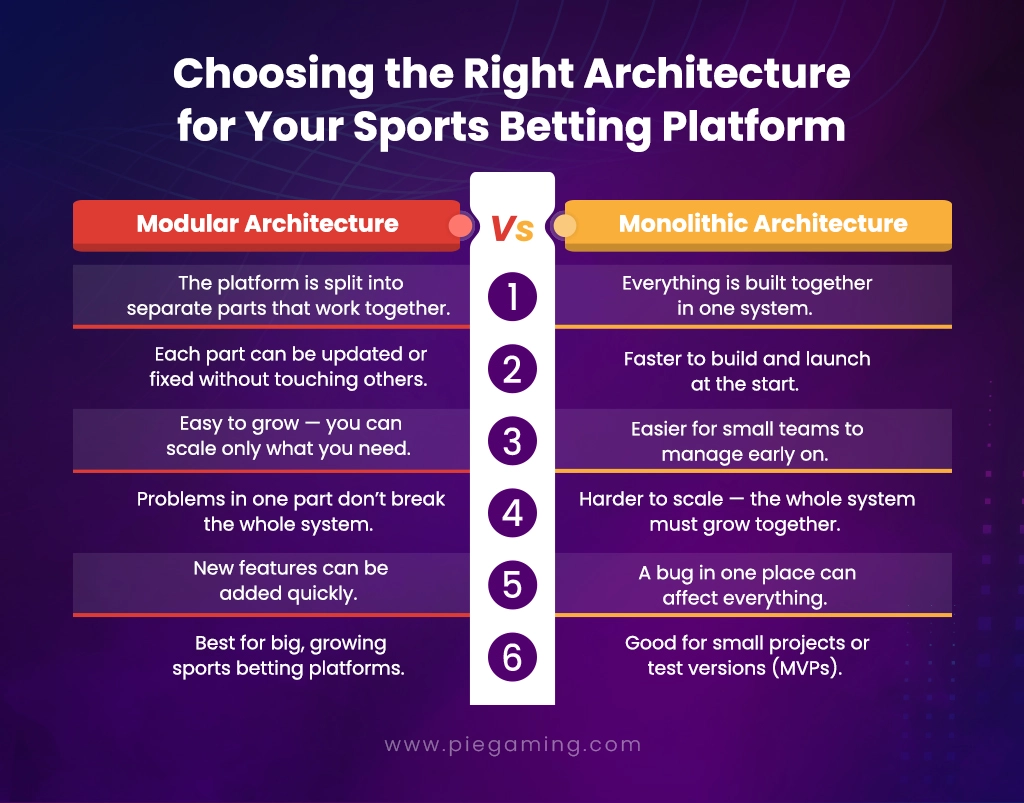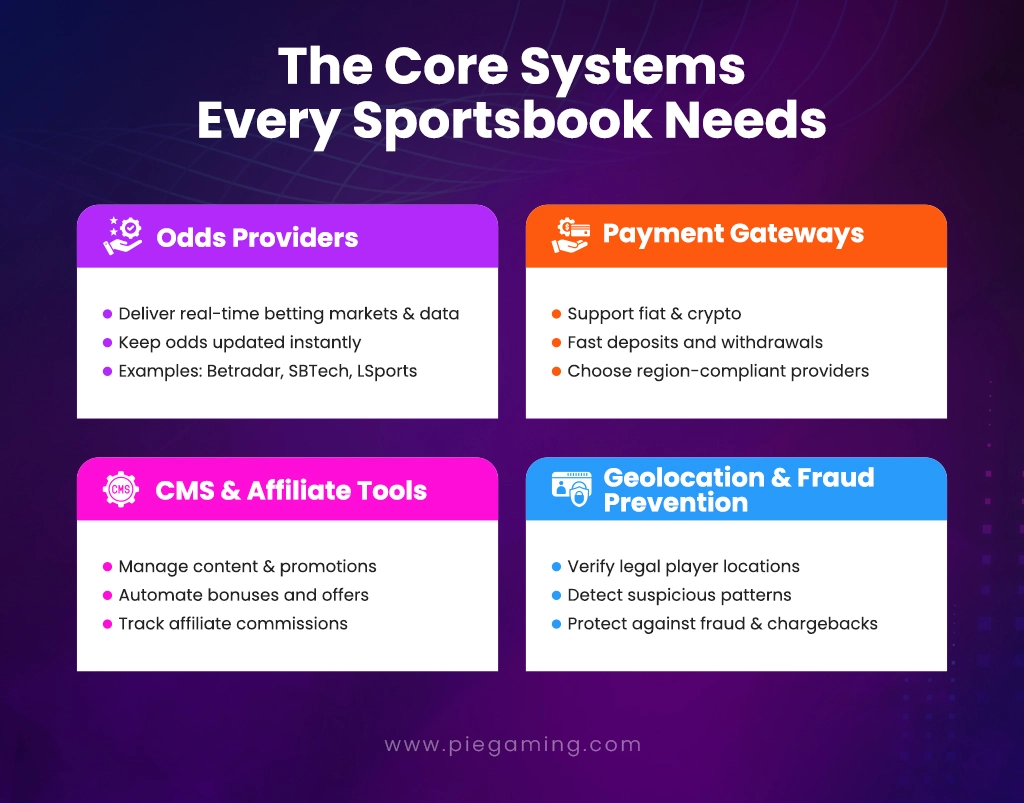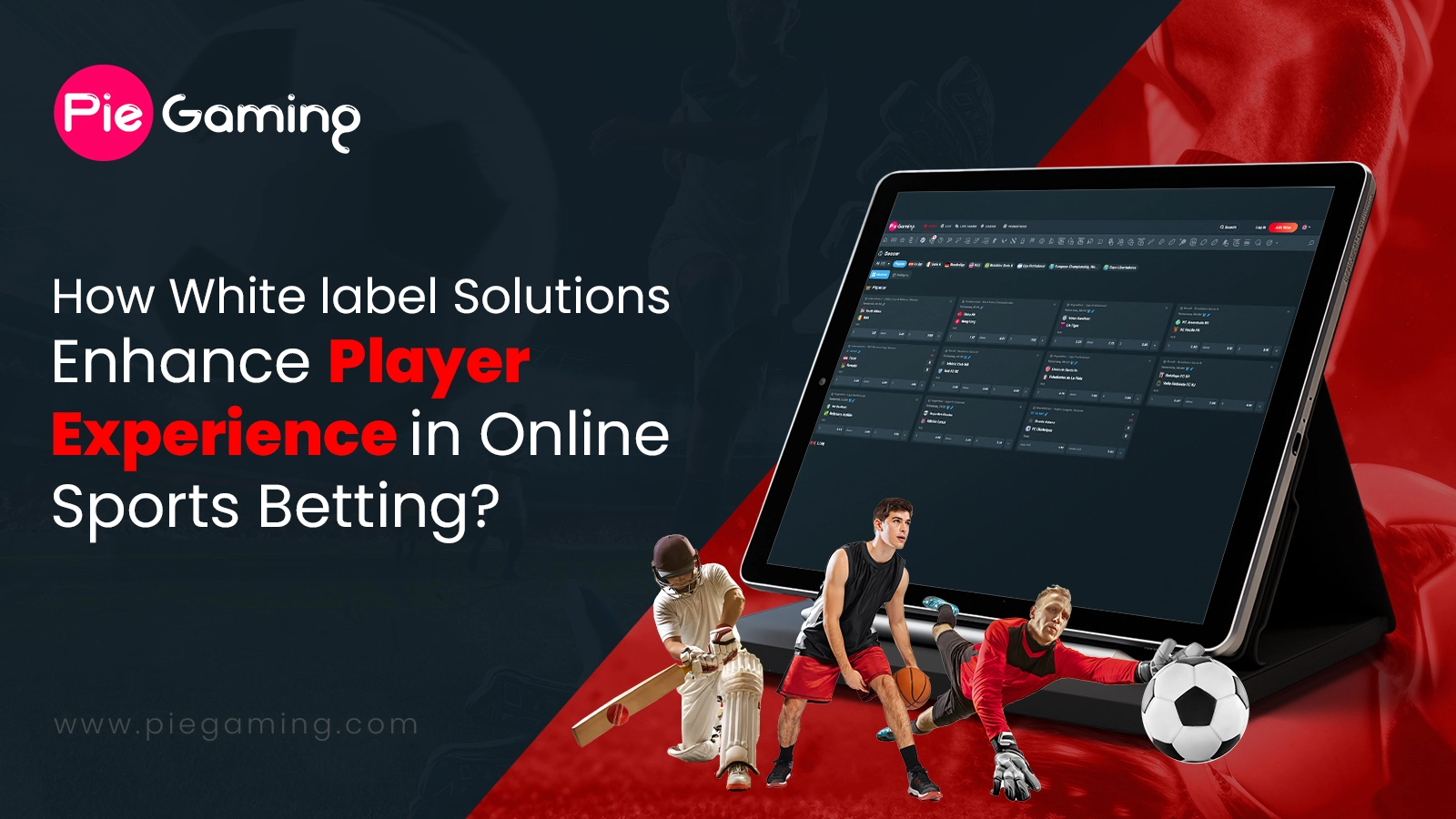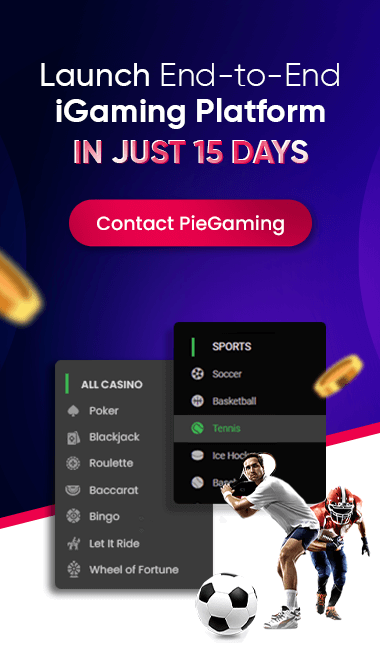How To Create Your Own Sports Betting Platform?
- Author:Palak Madan
- Read Time:9 min
- Published:
- Last Update:February 19th, 2026

Learn how to create your own sports betting platform, covering licensing, compliance, payments, and odds setup. Let’s find out whether it’s perfect for startups or brands.
Sports betting market is one of the fastest-growing segments in iGaming, and operators who create a smart sports betting platform can tap into a massive revenue stream.
But success takes more than just offering odds. You need the right platform, features,s and strategy to win big.
This guide breaks down exactly what you need to create a sports betting platform that attracts users and generates real revenue.
So, let’s dive in.
Understanding the Core of a Sports Betting Platform

Choosing the Right Architecture for Your Sports Betting Platform
When you are working to create a sports betting platform, your first major decision is choosing the right architectural approach. This choice will impact everything from development speed to long-term maintenance.
Modular Vs Monolithic Architecture
Modular architecture
It divides your platform into independent components that communicate through APIs. Each component handles specific functions and can be updated, scaled, or replaced without affecting others.
Monolithic Architecture
It builds everything as a single, unified application. It’s faster to develop initially and simpler to deploy, but it becomes harder to modify and scale as your platform grows.
Your platform needs three essential backend systems working together:
- The odds engine continuously calculates and updates odds based on live sports data, market movements, and risk management rules.
- Your bet slip management system processes every bet from placement through settlement, handling validation, risk checks, and payouts.
- The user management system controls account registration, authentication, payment processing, and compliance requirements.
Plan your infrastructure for growth from the start. Your system needs to handle peak traffic during major sporting events without performance issues.
Popular games can generate thousands of bets per second, so your architecture must scale efficiently to meet demand spikes.
If you want scalability and stability when you create a sports betting platform, these backend systems must be well optimized from the beginning.
Frontend Frameworks and UI/UX Design
Most of your users will bet on their phones, so design for mobile first. Start with the smallest screen and work your way up to the desktops. This approach ensures your online sportsbook platform works perfectly where people actually use it.
Personalization keeps users engaged longer. Show their favorite sports first, remember their betting preferences, and suggest relevant markets based on their history. Users want to see what matters to them without scrolling through endless options.
For localization, you need to do more than just translate text. Adapt odds formats for different regions—Americans prefer +150 while Europeans use 2.50. Currency displays, date formats, and even color schemes should match local preferences. What works in Europe might confuse users in Asia.
Real-time components are absolutely critical when you launch a sports betting platform. Your live odds need to update instantly without user refreshing the page. Cash-out buttons must work immediately when users want to exit bets early.
Key Integrations You’ll Need

The Core Systems Every Sportsbook Needs
Running a sports betting platform means connecting with multiple third-party services. These integrations are essential for legal operation and user experience.
Odds providers
Supply the betting markets and real-time data that power your platform. Popular options include Betradar, SBTech, and LSports. You will need reliable feeds that update instantly and cover what sports users want.
Payment Gateways
Payment gateways should handle both fiat and crypto payments. Users expect credit cards, bank transfers and e-wallets, plus bitcoin and other cryptocurrencies are becoming standard. Choose providers that support your target markets and offer fast withdrawals.
CMS and Affiliate Tools
It helps you manage content and track partner commissions. You’ll need systems to create promotions, manage bonuses, and pay affiliates accurately.
Geolocation and fraud prevention
It protects your business. GPS verification ensures users bet from legal locations, while fraud detection tools identify suspicious betting patterns and protect against chargebacks.
These are essential whether you plan to create your own betting website or opt for a turnkey sportsbook solution. Many operators who create a sports betting platform integrate these tools early to ensure compliance and safety.
Building the Bet Management Engine
Your bet management engine handles every bet that comes through your platform. It’s a system that takes bets, checks if they are valid, and pays out winners.
Start with the basics that people actually use. Single bets are simple—pick one team, win or lose. Accumulator bets let users stack multiple picks for bigger payouts, but they need to get everything right to win.
Live betting happens during games when odds keep changing. Virtual sports give users something to bet on when real games aren’t playing.
Additionally, you would need rules to protect yourself from going broke. Set limits on how much people can bet and watch for weird betting patterns. If someone’s trying to exploit your system, your validation should catch it before the bet goes through. Block any bets that will cost you too much if they win.
Furthermore, you need to pay winners quickly once games end—nobody likes waiting for their money. Keep your odds updated in real time by connecting to reliable data providers. If your odds are slow or wrong, players will notice and leave for competitors who get it right.
To create a sports betting platform successfully, your bet management system must be automated, compliant, and ready to handle massive volume.
Managing Live Betting Infrastructure
Live betting is where you make real money, but it’s also where things can go wrong fast. You need rock-solid infrastructure because bettors are betting on events happening right now, and any delay or mistakes cost you money.
The biggest challenge you will face is latency. Every millisecond matters when odds are changing constantly during live games. If your platform is even a few seconds behind, users will place bets on outdated information, and you will end up paying out on bets you should never have accepted. Combat this by using servers close to your users, optimizing your code for speed, and setting up multiple data feeds as back up options.
Streaming integration makes everything more complex but keeps users engaged. When people can watch the game while betting, they stay on your platform longer and bet more often. However, you need to make sure your video feed stays perfectly synced with your odds.
There’s nothing worse than showing a goal on screen while your betting interface still thinks the score is tied. That’s where auto-suspension mechanisms become critical.
Your system needs to automatically pause betting the moment something significant happens—an injury, a red card, or any controversial moment. Manual controls are too slow for live action, so build smart triggers that protect your business while keeping the betting experience smooth.
When you create your own betting site, this live betting infrastructure becomes your most crucial advantage. Many businesses create online sportsbook platforms focusing mainly on this area for user engagement and retention.
Compliance, Security, and Data Privacy
Running a sports betting platform means dealing with strict rules that can shut you down if you get them wrong. You need to comply with GDPR if you have European users, which means letting people control their personal data and delete their accounts completely.
Different countries have their own gaming laws too—what’s legal in the UK might be banned elsewhere. Getting ISO certifications shows regulators you are serious about security and helps build trust with users.
Encrypt everything, especially payment data and personal information. Use secure servers and never store sensitive data in plain text. Your database should be locked down tighter than Fort Knox.
Keep detailed logs of every transaction, bet, and user action. Regulators will ask for these records during audits, and you need to produce them quickly. Build automated reporting systems that generate compliance reports without manual work, because missing deadlines with regulators is expensive.
Compliance and transparency are what make your plan to create a sports betting platform sustainable in the long term.
Exploring Multi-Tenant vs White-Label Platforms: What’s Right for You?
If you’re planning to run more than one betting site, you’ve got two solid options to think about: building a multi-tenant platform or using a white-label solution. Both can work well, but they’re pretty different approaches.
Multi-tenant platforms allow you to operate dozens of different betting brands on a single core platform.
All of them share the underlying technology, and each brand enjoys its unique customized appearance, betting markets, and users. You develop once and can use many times, and generate many streams of revenue out of one development investment.
White label sportsbook solutions provide a reliable platform that is prepared to be customized for launch. It is all done by the provider, and thus you can concentrate on branding, marketing, and getting customers.
Multi-tenancy allows you full control, and you are free to develop what you want, but it will take months of complex code development.
You will have to address challenging issues such as storing information of various brands in different areas at the same time, processing numerous currencies, languages, and regulatory demands.
White-label will bring you to market in a much shorter time with a reduced technical risk, but you will not have as much control over the underlying system.
Each of these strategies has the potential to be profitable: multi-tenant is flexible over the long term, with licensing income potential, whereas white-label gives you a faster time to market. Consider your timeline, budget, and technical abilities.
| Skip the Build—Launch Faster with PieGaming in a Box
Building your own sportsbook platform is a massive project that eats up time, money, and your best developers. With PieGaming’s white label sports betting exchange solution, you skip all that hassle and get everything ready to go—your branding, rock-solid security, and room to grow. Why spend months building when you could be making money from day one? With PieGaming’s Turnkey Sportsbook Solution, you can create a sports betting platform and go live fast—without the long development process. |
Wrapping Up…
Creating a successful sports betting platform is more than just a good idea—you need the right people, reliable technology, and a solid plan.
It doesn’t matter if you build it from scratch or use an existing solution; what matters is getting the foundation right.
Do your homework, test everything multiple times, and make sure your platform works the way users expect it to.
FAQs
-
Can I legally create my own sports betting platform?
It depends on where you operate. Most places require special licenses to run betting sites. Laws are different in every country and state, so get proper legal advice before you start.
-
What features should a custom sports betting platform have?
You need live betting, real-time odds updates, secure payments, mobile support, strong security, identity verification, user accounts, and responsible gambling tools to stay compliant and keep users engaged.
-
Do I need technical knowledge to create my own sports betting site?
Not necessarily if you work with experienced providers. But understanding compliance rules, system integrations, platform technology, and user experience will help your project succeed better.
-
Can I add cryptocurrency payments to my sports betting platform?
Yes, crypto payments can offer faster and more private transactions. Just make sure both betting and cryptocurrency use are legal and properly regulated in the markets you want to serve.

Palak Madan is a enthusiastic writer at PieGaming. With over 2+years of experience crafting engaging content and a strong literature background, Palak brings a unique perspective to the world of words. Her ability to blend creativity with strategic thinking has made her a sought-after content creator. She's eager to dive deep into the intricacies of iGaming software, uncovering the stories behind the technology and translating complex features into compelling narratives.
-
 Palak Madan February 13, 2026
Palak Madan February 13, 2026Learn what virtual sports betting is, how it works, and why it’s growing fast in iGaming. A clear, practical guide for operators and betting platforms.
-
 Palak Madan September 29, 2025
Palak Madan September 29, 2025Discover the latest online casino and sports betting regulations in Algeria. Learn how the laws impact operators, players, and the future of iGaming in the region.
-
 Monika Gola August 5, 2025
Monika Gola August 5, 2025Armenia offers golden opportunities to iGaming operators. Here, get a quick insight into online casino and sports betting regulations in Armenia.
-
 Palak Madan June 20, 2025
Palak Madan June 20, 2025Canada’s 2025 iGaming laws vary by province. This guide breaks down what’s legal, what’s changing, and where online casinos and sports betting stand…
-
 Monika Gola June 19, 2025
Monika Gola June 19, 2025Mexico is actively developing as a promising iGaming market. It’s a golden opportunity for operators to learn about online casino and sports betting…
-
 Monika Gola June 5, 2025
Monika Gola June 5, 2025Planning to launch your iGaming business in Malta? This free guide covers sports betting and online casino regulations in Malta to help you…
-
 Palak Madan April 29, 2025
Palak Madan April 29, 2025This guide lists the top 10 sports betting odds providers in 2026, helping operators choose fast, accurate, and reliable data sources for their…
-
 Monika Gola April 28, 2025
Monika Gola April 28, 2025Spain has witnessed remarkable growth in the iGaming industry globally. This blog discusses online casino and sports betting regulations Spain. Stride along till…
-
 Palak Madan April 23, 2025
Palak Madan April 23, 2025The UK’s online sports betting and casino regulations in 2025 focus on permits, following rules, and keeping players safe. Companies must follow new…
-
 Monika Gola April 10, 2025
Monika Gola April 10, 2025Sports betting has been in the roots of South Africa. It’s an opportunity for operators to run an iGaming business and rake in…
-
 Palak Madan February 26, 2025
Palak Madan February 26, 2025Sports betting software development involves creating custom platforms. These platforms help manage bets, process payments securely, and provide live betting options. They also…
-
 Palak Madan November 20, 2024
Palak Madan November 20, 2024Starting a sports betting business in the UK involves ensuring compliance, obtaining licenses, selecting software, setting up payment systems, and much more. Let’s…
-
 Monika Gola August 9, 2024
Monika Gola August 9, 2024A trusted sportsbook platform handles odds, risks, and real-time betting. This guide highlights the top sportsbook software providers to trust. Launching or scaling…
-
 Nikita Ajmani July 11, 2024
Nikita Ajmani July 11, 2024Sports Betting in the iGaming Industry: A market finally getting its dues! Existing for over a century in various parts of the world,…
-
 Simranjeet Kaur July 5, 2024
Simranjeet Kaur July 5, 2024In the high-stakes sports betting world, fortunes can be made or lost as a result of a single match outcome. But what if…
-
 Palak Madan May 28, 2024
Palak Madan May 28, 2024This blog explores the world of sports betting, covering new sports betting trends like mobile apps and AI, key challenges, and future growth…
-
 Simranjeet Kaur May 14, 2024
Simranjeet Kaur May 14, 2024Let’s understand sports betting and odds in sports betting, how they are calculated, and how as a beginner, you can read them.
-
 Palak Madan April 4, 2024
Palak Madan April 4, 2024Explore the future of online sports betting in 2025 and learn how innovation, data, and evolving regulations are shaping growth and global market opportunities.
-
 Palak Madan March 6, 2024
Palak Madan March 6, 2024Launching or running a sportsbook? This Online Sports Betting Sites Checklist reveals key features and compliance steps that you don’t want to miss.
-
 Palak Madan February 8, 2024
Palak Madan February 8, 2024Discover everything you need to know about white label betting exchange solutions in 2025. Learn how they work, and how to launch your own platform.
-
 Palak Madan February 1, 2024
Palak Madan February 1, 2024See how white label sportsbook solutions make online sports betting better. Explore custom features, quick setup, and benefits for operators in 2025.
-
 Monika Gola January 31, 2024
Monika Gola January 31, 2024Discover the top 6 tips for selecting reliable turnkey betting platform providers to enhance the betting experience for your customers. Click to read now.
-
 Palak Madan January 16, 2024
Palak Madan January 16, 2024Here’s the list of the leading 5 whitelabel sports betting exchange providers worth exploring. Note their exceptional services & offerings setting them apart.
-
 Monika Gola December 6, 2023
Monika Gola December 6, 2023The growing popularity of sports betting is opening doors for operators. Read here the history, present and future of the global sports betting…
Voila!
See you in your inbox soon!

Stay ahead of the game. Subscribe for exclusive content, updates, and insiders!
We use cookies to enhance and personalize your browsing experience. By continuing to use our website, you agree to our Privacy Policy.




